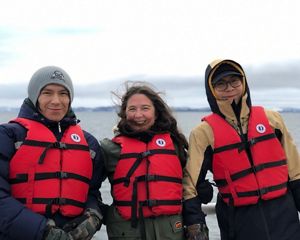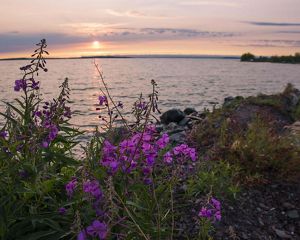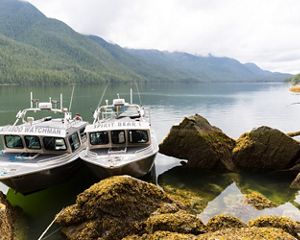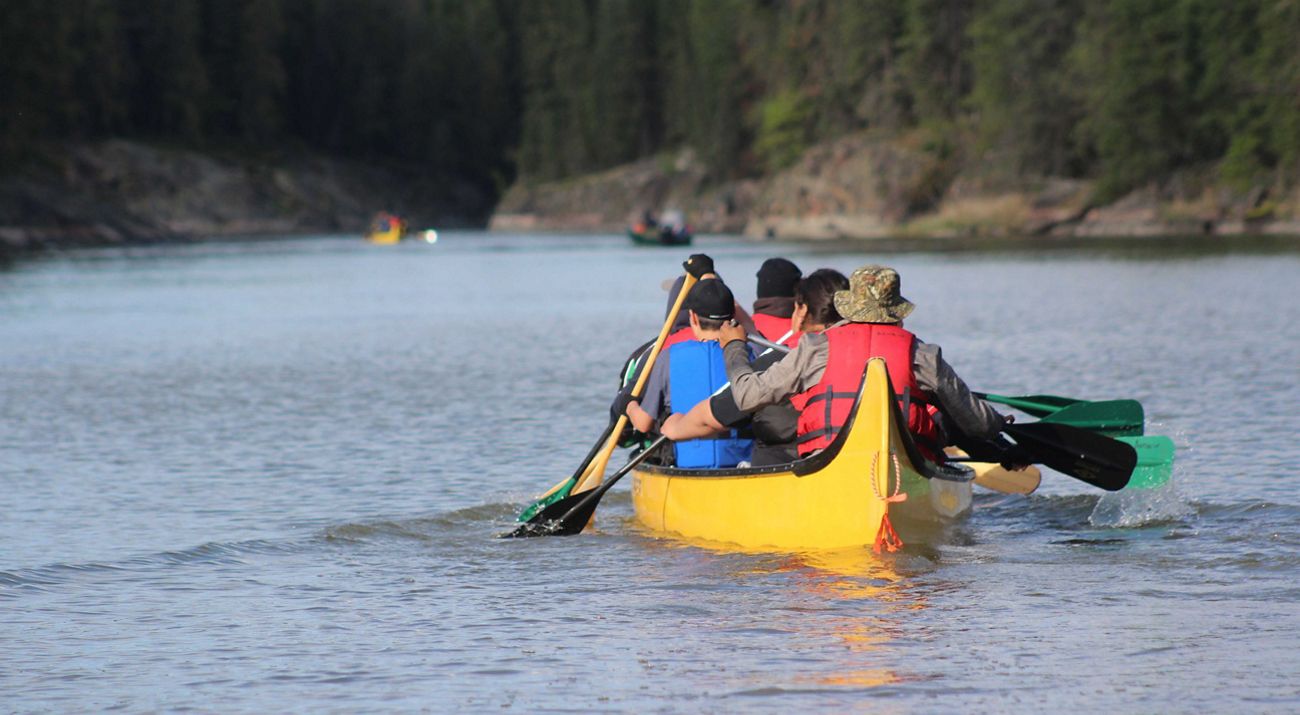
Pulse of the Land: Supporting Indigenous Youth and Communities in Building Intergenerational Leadership
Indigenous youth are the heartbeat of their communities, and their knowledge, strength and vision as emerging leaders are vital to protecting the lands and waters that sustain us all. In recognition of their ongoing and future leadership, the Youth On the Land Opportunities (YOLO) Community Network is developing a new online hub designed to connect and uplift more than 350 individuals involved with Indigenous-led on-the-land learning programs across Canada.
"The YOLO Network helps amplify Indigenous leadership and support deep, peer-to-peer learning to enhance the work communities are already doing to support their youth in learning about their lands and waters," says Zahra Remtulla, the Indigenous Youth On the Land Support Lead at Nature United, who helped start the YOLO Network. Our organization has been supporting youth programming in partnership with Indigenous communities for more than a decade. "Our hope has always been to catalyze new and innovative programming that shifts to more sustainable funding over time, and YOLO is filling an important gap in the system."

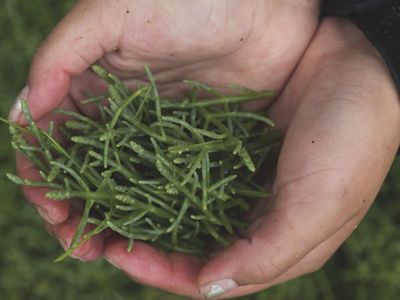
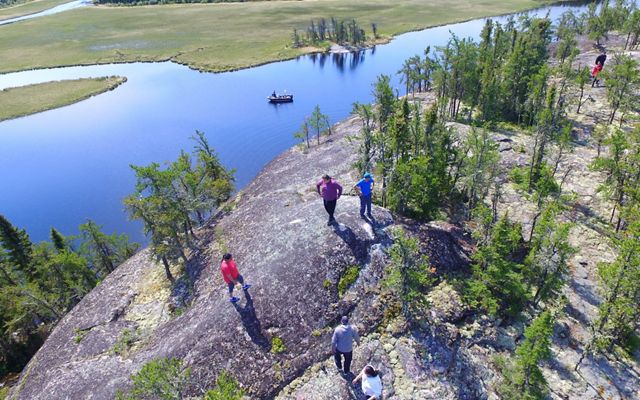

On the new YOLO online hub, practitioners can explore a map of programs across territories, participate in virtual learning circles and access training and resources to support them in building and leading programs in their communities. Regularly updated grant listings, fundraising guides and community news make the site a go-to space for anyone engaged in this vital work. More than just a website, this platform will serve as a gathering space where practitioners can collaborate, share experiences and be part of a wider community of practice. It's a space where new ideas take root, and existing efforts are fortified through collective wisdom.
"We've hear from practitioners on the ground they want to connect and learn from each other across communities," says Claire Hutton, Nature United's Indigenous Stewardship Director. "People want to share practical details about their experience building and running programs to connect their youth to their territories and cultures. Having spaces to share what's working and not working, and to learn from each other, makes a difference."
Quote: Deanna Duncan
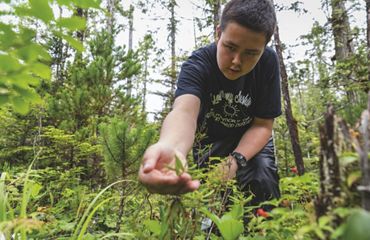
Every student in the school receives a traditional name, often after a place or resource. When we talked to the hereditary chiefs, we were told that the students were given those names because those are the things they will look after in the future. And they’ve already started.
This spirit of shared learning and connection to the territory reflects what is already happening on the ground. In communities such as Kitasoo/Xai'xais First Nation in the Great Bear Rainforest, on British Columbia's central coast, youth are deeply engaged in activities on the land — such as harvesting seaweed and digging for clams. Today we have former SEAS students out patrolling territory with the Indigenous Guardians crew and studying culturally modified trees. These experiences are part of Supporting Emerging Aboriginal Stewards (SEAS), a youth program launched in 2012 with support from Nature United, which connects youth with their environment through internships, hands-on learning and mentorship.
Deanna Duncan, who coordinates the Kitasoo/Xai'xais Community School SEAS program, sees the work as deeply rooted in identity. "Every student in the school receives a traditional name, often after a place or resource," she explains. "When we talked to the hereditary chiefs, we were told that the students were given those names because those are the things they will look after in the future. And they've already started. Lots of our youth have taken on roles to continue to conserve our resources and watch over our territory and land."
Supporting Indigenous Youth
Why On-The-Land and On-The-Water Programming is Important
Read the ReportPrograms such as SEAS create authentic space for intergenerational knowledge-sharing and equip youth to lead their communities. These initiatives support health, food security, cultural revitalization, education, employment and environmental stewardship. Many communities are now planning for future stewardship roles — such as Indigenous Guardians, administrators and researchers — by strengthening youth connections to their territories.
As more Nations develop these programs, the YOLO Network and its new online hub are helping create a backbone of support for the movement. YOLO's first Network Coordinator, Shea Henderson, describes the value: "The YOLO network has offered a space for connection and knowledge exchange with peers across the country, and those conversations have provided insight and guidance for how we can strengthen any work we are doing with youth on the land at a local level.

The YOLO Community Network has become a vital resource for Indigenous Guardians and educators across the country, including those working in remote and northern communities. It supports the development of culturally grounded curriculum, helps connect youth with Elders and Knowledge Keepers, and works alongside the expanding capacity of local programs to monitor and care for their territories.
Henderson is working to ensure the Network continues to be guided by Indigenous leadership, grounded in community knowledge and shaped by meaningful collaboration. To support this work, the Network is actively seeking advisors from across the country, whose lived experience and perspective will help guide the path forward.
Quote: Shea Henderson
We’re all striving toward the same goal: walking alongside youth as they root their learning in the land and grow relationships that honour people, place and the natural world. Having spaces to share, collaborate and grow ideas is not only valuable — it is essential.
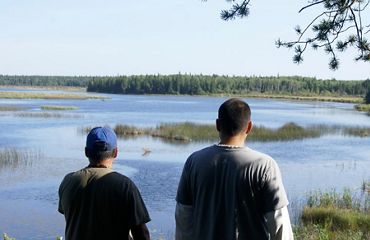
Committed to Working in Respectful Partnership
Read about the other ways we are supporting Indigenous-led conservation.
Read MoreInitiatives such as YOLO walk and learn alongside Indigenous-led conservation, ensuring that lands and waters continue to be cared for by future generations. When people come together with shared values and a collective vision, grounded in the spirit of stewardship that has guided Indigenous communities for generations, they help shape a future built on respect, resurgence and relational accountability. These efforts honour the land, deepen cultural connections and support the next generation in carrying forward a lineage of care rooted in reciprocity and responsibility to all relations.
"We’re all striving toward the same goal: walking alongside youth as they root their learning in the land and grow relationships that honour people, place and the natural world," says Henderson. "Having spaces to share, collaborate and grow ideas is not only valuable — it is essential."
Explore YOLO's new online hub, connect with other land-based leaders, and access tools, stories and shared wisdom to support your journey. Whether you're just beginning or building on existing efforts, there's a place for you — grounded in mutual respect, shared responsibility and our connections to land and community.
If you're interested to learn more about the YOLO Community Network, or if you or someone you in your community is interested in joining the YOLO advisory group, please email youthontheland@gmail.com to learn more.
